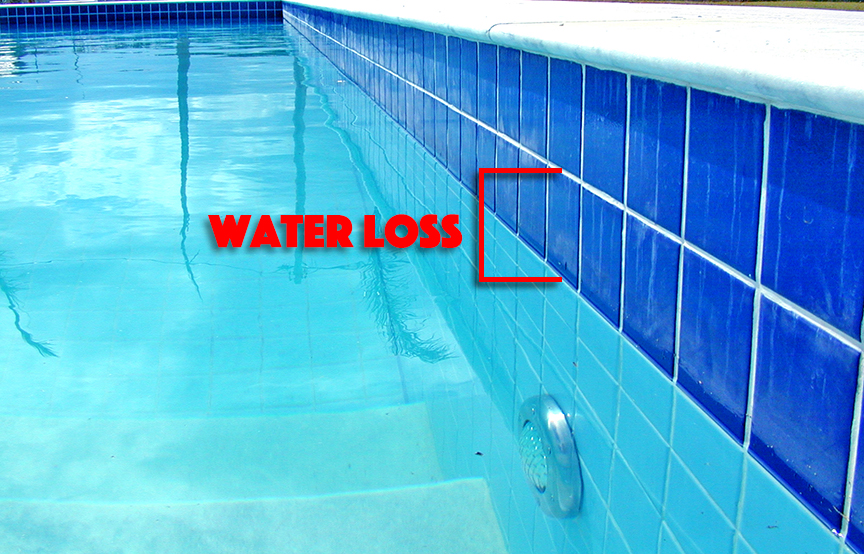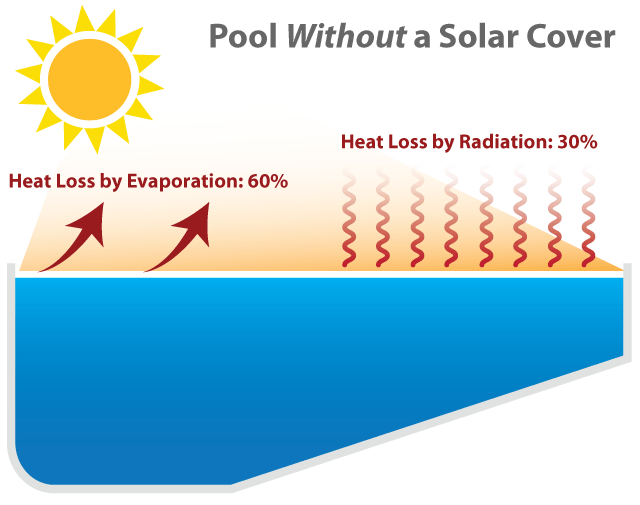Are you tired of watching your pool’s water level drop mysteriously? You’re not alone.
Many pool owners find themselves puzzled and frustrated by this common issue. Not only can it be costly, but it also disrupts your relaxation time and enjoyment. We’ll dive into the reasons why your pool keeps losing water and how you can take action to fix it.
By the end, you’ll have a clear understanding and peace of mind, ensuring your pool is always ready for a refreshing swim. Keep reading to uncover the secrets behind your vanishing pool water and regain control of your oasis.

Credit: www.angi.com
Common Causes Of Pool Water Loss
Is your pool mysteriously losing water? You’re not alone. Understanding the common causes of pool water loss can help you solve this frustrating problem. Whether it’s natural evaporation, structural leaks, or issues with your plumbing system, recognizing these causes can save you time and money.
Evaporation is a natural process that can significantly affect your pool’s water level. Hot, dry weather accelerates water loss, especially if your pool is exposed to direct sunlight. Wind can also play a part, increasing evaporation rates. Consider using a pool cover to reduce exposure. Have you noticed your pool losing more water on windy days?
Leaks In Pool Structure
Leaks can be a major culprit in water loss. Cracks in the pool walls or floor might be causing water to seep out. Check for wet spots around the pool area or visible cracks. A simple dye test can help pinpoint the location of leaks. Have you ever found a suspicious puddle near your pool?
Your pool’s plumbing system could also be the reason for water loss. Faulty pipes or joints can lead to leaks. Inspect the plumbing for any signs of wear or damage. Regular maintenance can prevent these issues from escalating. Have you checked your pool’s plumbing recently?
Addressing these common causes can keep your pool full and ready for swimming. Don’t let water loss dampen your pool enjoyment!
Evaporation Factors
Understanding why your pool loses water is essential. Evaporation is a major factor. Various elements influence the rate of evaporation. Knowing these can help manage water loss.
Weather Conditions
Weather plays a crucial role in evaporation. Hot, dry climates increase evaporation rates. Windy days make water disappear faster. Cooler, humid conditions slow down the process. Monitor the weather to anticipate changes in water levels.
Pool Surface Area
The size of your pool affects evaporation. Larger pools have more surface area. More area means more water exposed to air. Smaller pools lose water slower. Covering the pool can reduce exposure. This helps in maintaining water levels.
Water Temperature
Water temperature impacts evaporation rates. Warm water evaporates quicker than cold. Heated pools lose more water. Lowering the temperature can decrease evaporation. Temperature control is a key factor to consider.
Identifying Leaks In Pool Structure
Does your pool seem to lose water faster than it should? You might be dealing with a structural leak. Identifying these leaks early can prevent costly repairs later. Understanding the signs and detection methods is vital for pool maintenance.
Signs Of Structural Leaks
Notice any unexpected water loss? It might be a sign of a structural leak. Look for cracks in the pool surface. These often indicate a leak. Check for soggy areas around the pool. They can signal water escaping from the structure. Listen for the sound of water trickling. It can mean water is leaking through a crack.
Diy Leak Detection Methods
Want to try finding leaks yourself? Start with a simple bucket test. Fill a bucket with pool water. Place it on the pool steps. Mark the water level inside and outside the bucket. Check the levels after 24 hours. If the pool water drops more, you might have a leak. Another method involves food coloring. Squirt it near suspected areas. Watch if the color gets sucked into a crack.
Professional Leak Detection
Can’t pinpoint the leak? Consider hiring a professional. Experts have tools to detect leaks accurately. They use pressure testing and electronic listening devices. These methods locate leaks without emptying the pool. Professionals can also inspect the pool’s plumbing. This ensures no hidden leaks go unnoticed.

Credit: www.caltechpools.com
Plumbing System Issues
Plumbing system issues often lead to water loss in pools. It’s a common problem many pool owners face. Understanding these problems can help in fixing them. Broken pipes, faulty equipment, and poor maintenance are usual suspects. Let’s dive into each to get a clearer picture.
Broken Or Loose Pipes
Pipes are crucial for smooth water flow. When they break, water escapes. Loose pipes can also lead to leaks. Check for visible cracks or bends. Ensure pipe joints are tight and secure. Early detection prevents bigger problems.
Problems With Pool Equipment
Pool equipment includes pumps, filters, and heaters. Faulty equipment can cause water loss. Pumps may leak when seals wear out. Filters might crack under pressure. Inspect equipment regularly for damage. Replace worn-out parts promptly.
Repair And Maintenance Tips
Regular checks keep plumbing issues at bay. Inspect pipes and equipment monthly. Tighten loose connections immediately. Clean and maintain equipment regularly. Use quality materials for repairs. Seek professional help when needed. Routine care extends pool life and saves water.
Preventive Measures
Persistent pool water loss demands attention. Checking for leaks in the pool structure or plumbing is vital. Regular maintenance, such as monitoring evaporation and ensuring proper sealing, helps maintain water levels.
Owning a pool is a delightful luxury, but noticing a constant drop in water levels can be frustrating. Understanding the preventive measures can save you time, money, and hassle. By implementing these strategies, you can enjoy your pool without the stress of unwanted water loss.
Regular Maintenance Routine
A regular maintenance routine is crucial to prevent water loss. Simple tasks like checking for leaks or inspecting the pool’s surfaces can make a significant difference. Just like how you would routinely check your car’s oil levels, your pool needs similar attention to catch issues before they escalate. Ensure the pool’s plumbing is in good condition. Leaks often occur in pipes, filters, and pumps. A friend once discovered a significant water loss due to a tiny crack in a pipe. Catching it early saved him from a hefty repair bill.
Water Level Monitoring
Monitoring your pool’s water level is an easy yet effective preventive measure. Keep an eye on the waterline regularly. If you notice a drop exceeding half an inch per day, it’s time to investigate. Consider marking the waterline with a waterproof marker. This small step can help you detect even the slightest changes. Are you aware of how much water your pool loses to evaporation? It might be less than you think.
Efficient Pool Covers
Using an efficient pool cover can significantly reduce water evaporation. A good pool cover can save up to 90% of water loss, making it a worthwhile investment. Choose a cover that fits well and is easy to handle. A neighbor once shared how her pool cover reduced her water bill remarkably. Have you considered how a cover might save you money? By adopting these preventive measures, you can keep your pool at its best. Start with small steps today and enjoy a worry-free swimming experience.
When To Call A Professional
Persistent water loss in a pool signals a problem needing expert attention. Leaks or evaporation issues can worsen without intervention. A professional can identify and fix the underlying cause efficiently.
When your pool keeps losing water, determining the cause can be a frustrating experience. Sometimes, the problem isn’t straightforward, and you might find yourself in over your head. That’s when it’s crucial to know when to call a professional. While minor issues can often be handled with a DIY approach, more complex problems require expert attention. Understanding when to make that call can save you time, money, and a whole lot of stress.
Complex Leak Situations
Imagine you’ve checked all the usual suspects—evaporation, splashing, filter backwashing—and your pool is still losing water. This suggests you might be dealing with a complex leak situation. Leaks can occur in hidden plumbing lines or beneath the pool deck, making them difficult to detect. Professionals have specialized equipment like pressure testing tools and electronic listening devices to pinpoint these elusive leaks. Trying to fix these issues yourself could lead to more damage. Have you ever thought about how much water a small, undetected leak can waste over time? A professional’s expertise ensures you address the root of the problem effectively.
Major Structural Repairs
If your pool has cracks or other structural issues, it’s time to call in a professional. Structural problems might mean your pool’s shell, liner, or foundation is compromised. These issues not only cause water loss but can also affect the pool’s integrity. Handling major structural repairs without proper knowledge can exacerbate the problem. Remember that friend who tried to fix their pool’s crack only for it to widen over time? Avoid making the same mistake. A professional can assess the damage and determine the best repair method, ensuring your pool remains safe and functional.
Evaluating Repair Costs
Understanding the cost of repairs is crucial in making informed decisions. Professionals can provide a detailed estimate, highlighting the extent of the damage and the necessary repairs. This transparency helps you budget effectively and avoid unexpected expenses. Consider how frustrating it would be to attempt a repair yourself, only to realize halfway through that it requires more work and money than anticipated. By consulting a professional, you gain clarity on repair costs and can weigh your options. Have you ever pondered the long-term savings of a professional repair versus a temporary DIY fix? Sometimes, investing in expert help upfront can save you more in the future.

Credit: pinchapenny.com
Frequently Asked Questions
What Causes My Pool To Lose Water?
Pool water loss can result from evaporation, leaks, or splash-out. Check for visible cracks or worn-out equipment.
How Can I Check For Pool Leaks?
Perform a bucket test. Fill a bucket with water, mark the level, and compare it to the pool after 24 hours.
Is Evaporation Normal In Pools?
Yes, evaporation is normal. Factors like temperature, humidity, and wind affect how much water evaporates.
Can Pool Equipment Cause Water Loss?
Yes, faulty equipment like pumps or filters can cause leaks. Inspect equipment regularly for signs of wear or damage.
How Do I Fix Pool Water Loss?
Identify the cause first. Repair leaks, replace faulty equipment, or use a pool cover to reduce evaporation.
Conclusion
A pool losing water can frustrate many owners. Identifying causes is key. Check for leaks in pipes or liners. Consider evaporation or splashes as potential reasons. Regular maintenance prevents major problems. Keep an eye on water levels often. Small issues can lead to big repairs.
Addressing problems early saves money and time. Consult a professional if unsure. Your pool should provide joy, not stress. Maintain it well for lasting enjoyment. Enjoy peace of mind knowing your pool is in good shape.





